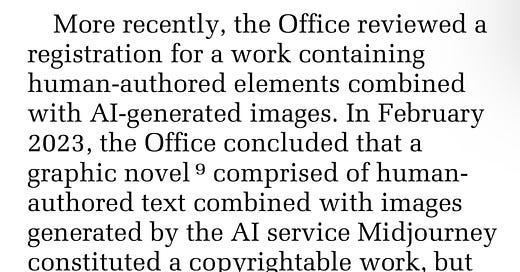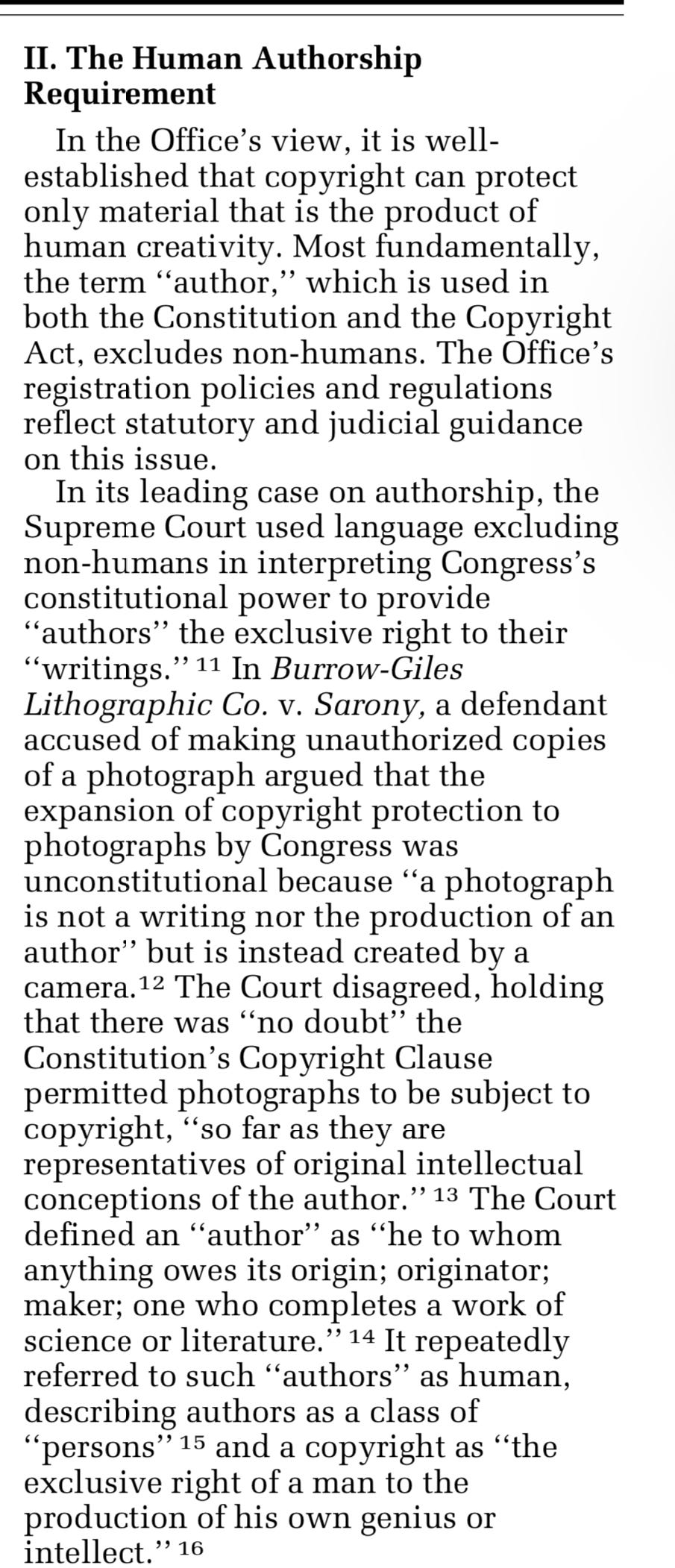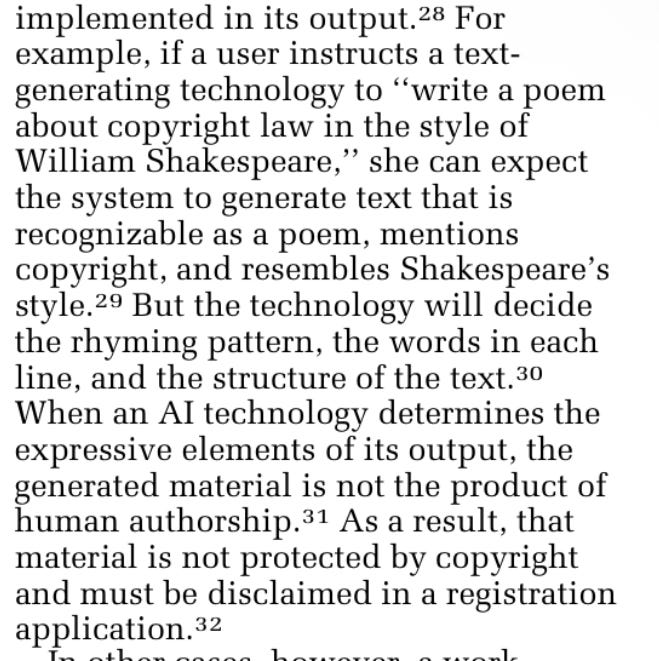Hollywood Writers and Existential Insight Into Meaning
Distinguishing Meaning From Meaning-Language Particles
“The D.G.A. [Director’s Guild of America] said Sunday [early June, 2023] that it received a ‘groundbreaking agreement confirming that A.I. is not a person and that generative A.I. cannot replace the duties performed by members.’”
What?
Oh? Hollywood has frozen and needs a reboot. Is there an admin in the house to reset the preferences? Residuals, streaming, money money money money. And then the bot.
Directors returned to work several weeks ago, directing I guess, but yesterday the Screen Actors Guild announced its strike beginning today, July 14, in solidarity with the WGA, which picked up the picket sign back in the day in AI time on May 2. In fact, SAG has been on the streets with WGA since day one. Although they work for the Directors, the Screen Actors Guild evidently didn’t find the guardrails (i.e., concurring that AI is not a person) on AI sufficiently responsive to the threat of writer extinction, largely due to AI’s capacity to a) imitate famous voices and b) digitally replicate bodily postures, actions, reactions, speech, two things in the actor’s wheelhouse. Stunt doubles may be in trouble of digital video bubbles, double deep faked.
As I say, the Writer’s Guild of America (WGA) kicked off its strike on May 2, 2023, and may not resolve the conflict until October, I’m reading. Some writers characterize it as an “existential crisis,” by which I assume they mean a fight for survival, not a state of fear and trembling on the verge of merging with an Oak tree like the character in Sartre’s novel Nausea or making a leap of faith like Kierkegaard’s Knight of Infinite Resignation or Hemingway’s Jake Barnes. Btw, I knew those texts, I didn’t prompt the bot, I wasn’t tutored in them nor reminded of them in a screen. Among my favorite courses as an undergraduate was Existentialism. Had I learned of them via the bot, would my referencing them here constitute illegal or even academically corrupt behavior?
Fair pay is part of the conflict, but the real issue is existential if extinction is the outcome. One did not successfully negotiate a path through an existential crisis if the outcome is silence. WGA leaders claim that the moneyed “are seemingly intent on continuing their efforts to destroy the profession of writing.” Note well, writing professionals and teachers and students, too. Mike Schnur, the writer of “The Good Place,” a deontologically incredible example of utilitarian ingenuity, and a member of the WGA bargaining committee, reportedly said the union hopes to “draw a line in the sand right now and say, ‘Writers are human beings.’” Such an utterance would have seemed absurdly obvious just seven or eight months ago.
So What?
Pk12 schools and universities ought to be tracking this dispute for insights into putting guardrails on the language bot in literacy pedagogy and in disciplinary instruction. Directors, writers, and actors have analogues, née, antecedents in classrooms—teachers, text writers (making them), and text actors (doing things with them)1. WGA has articulated two pregnant demands with implications for all writers now that the bot will very soon reside in your metacognitive closet.
First, WGA seeks to guarantee that studios are forbidden from generating artificial source material and then paying humans much less money than they would pay an author to adapt the ideas to the screen the way humans adapt a novel. Authors are the original humans, after all. The relevance to the classroom is obvious. Student gets a writing assignment; student feeds the assignment to the bot; the bot generates language aligned with the parameters of the prompt; student reworks and reshapes the language to add surprise, maybe makes a grammatical error or two; student gets credit, symbolic capital, a ticket to ride, a weakness in character growing weaker. It must be crystal clear: Humans must scrape their brains before they scrape the bot.
Second, even then, with a mandatory Origo for a writing project in human thought, not in a prompt to the bot, WGA also seeks to guarantee that scripts, treatments, outlines, or even discrete scenes can never be written or rewritten by chatbots. Scraping the bot must not distort, change, or revise human visions and final copies. “A terrible case of like, ‘Oh, I read through your scripts, I didn’t like the scene, so I had ChatGPT rewrite the scene’ — that’s the nightmare scenario,” Mr. August, who is also on the writers bargaining committee, said.
In classrooms this scenario translates to barring AI from replacing human writers (a phrase that should be redundant, I realize), during prewriting, drafting, and revising. There are appropriate and effective ways to incorporate an AI assistant during writing, but they are as yet without research. Guidance during the upcoming year must be cautious but thoughtful and rooted in theory. More on this topic later.
In March, 2023, the U.S. Copyright Office published a document clarifying its approach to issuing ownership rights to authors of texts. By February, 2023, three months before WGA began picketing, the Office had been dealing with AI-infused issues:
Could these images be acceptable if submitted on a class assignment? Would disclosure that the images are AI sourced permit publication of a poem accompanied by an AI image in a creative writing anthology or school-based journal. Citing arguments like the case of the monkey who shoots a photograph, raising the issue of whether credit is due the monkey or the camera, resolved by the ruling that photographers are human, the Copyright Office agrees that authors are legally human:
One of my first experiences with Meta’s bot Bard happened out of my intense curiosity to see if the bot could write poetry. For years I’ve thought this to be the test of artificial yet human intelligence. One of my first prompts to Bard went something like “write a poem in the style of William Carlos Williams.” I expected an unrhymed poem lacking the vibrant images, the red wheelbarrow, the cold plums, possibly a poem of abstraction with a few concrete details. Sure enough. The focal image was a white coffee cup, steaming, a kitchen table, a window, a tree. Pure garbage. Sorry. The Copyright Office beat me to it by four months with a much more evolved prompt:
Now What?
According to a media report, the California State University Faculty Senate has calendared a meeting in August to hammer out academic guidelines for the upcoming school year. I’m interested in seeing the work product of this group. I’m not informed about the California State Department of Education plans for guidance of the public school system. The University of California system is undoubtedly in the forefront of thinking together with Stanford. My eyes and ears will be focused.
In the meantime, I’ve formed a consulting relationship with my friend and colleague, Jeff Brodd, who is teaching an Honors seminar in the fall at Sac State. Students will read, discuss, and write about pieces of literature published before the 15th century in the West, in China, and in India.
My early suggestion to Jeff is
to center in-class activities on how to use ChatGPT in reading assignments, to sanction its use for specific purposes during reading assignments out of class, to sharply limit its use in writing assignments, and to emphasize traditional themes from literacy pedagogy, including writing groups, author’s chair, authentic voice, inspiration, writers craft, authentic audience, style, and publication.
By really validating the Supreme Court’s view of authors as human and honoring writing and authors as a valued classroom practice and role, minimizing a punishment perspective, and directly teaching AI and reading, a synergy might develop. In my tentative view, though the likelihood of damage with a bot as an assistant during reading work is high, guidance can mitigate the risk and maximize the benefits. Trying to integrate the bot into writing given the circumstances could be courting academic disaster.
Cevetti, G. N., & Pearson, P. D. (2023) Disciplinary reading,
action, and social change. The Reading Teacher (Spring, 2033)





